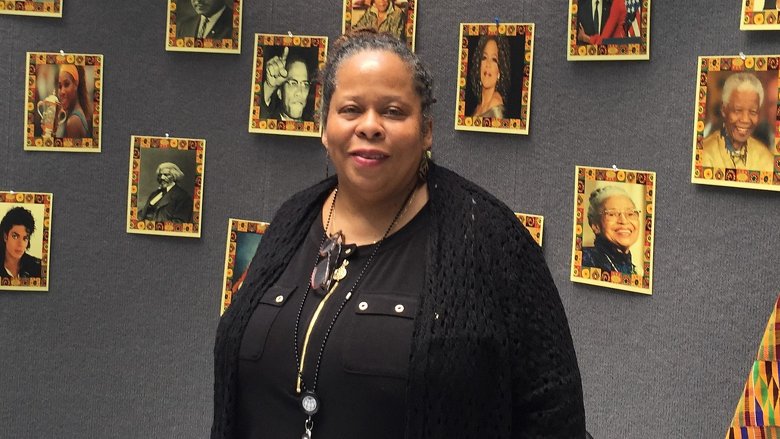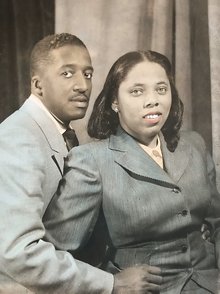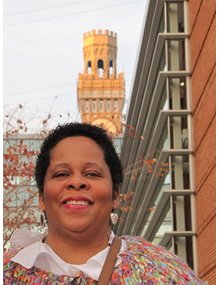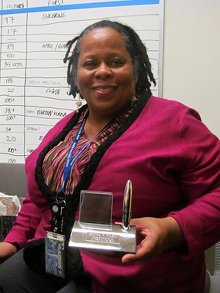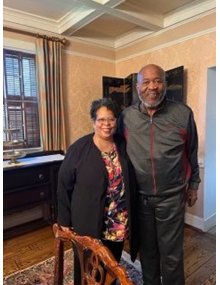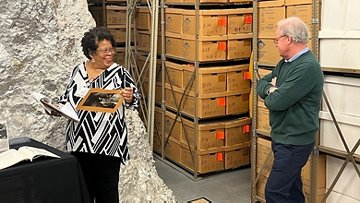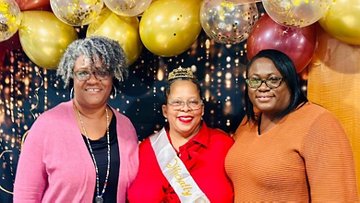Growing up in DC and joining the Bank
Unlike so many World Bank Group (WBG) staff, you are a native of Washington DC, having grown up in the District and lived all of your life in the DC area. What was your awareness of the WBG before you started working here? And how did you arrive at the Bank?
I began my professional career in litigation support for a local software company and then began working in records management for law firms, eventually becoming a legal records manager. Prior to starting my Bank career and during my first couple of years here, I was on the board of the Greater Washington DC chapter of the Association of Records Managers and Administrators (GWDC ARMA). A future colleague of mine at the Bank was also a member of GWDC ARMA and gave records management presentations at chapter meetings so I became familiar with the Bank on a very basic level – but I was not aware of its expansive global impact and all of its DC buildings.
After many years in the legal field, I was ready for a fresh start. My career consultant knew that I was looking for something new, so she advised me to interview for a position at the Bank. When I arrived at the former H Building for my interview, I found a parking space right in front of the building -- a great sign!
In March 1999 I was offered both an agency contract reference archivist position at the Bank and a legal records manager position at a boutique Georgetown law firm. One of my close friends, a former law firm colleague, told me that the Bank was a wonderful place to work and that I would be a great fit. After careful consideration I stepped out on faith and accepted the Bank position.
How was working at the Bank different than other environments you worked in?
During my first few years at the Bank, my exposure to other staff was limited to my interactions with Archives staff and clients and other H- and I-building staff. After the Archives moved to the Main Complex (MC), I interacted with more staff but was disheartened to hear that Black Americans who performed well were not promoted as often, if at all, compared to other nationalities. After a few months in the MC, I learned about the diverse fellowship opportunities in the Bank. I joined the WBG-IMF African American and WBG-IMF Staff Catholic associations. I welcomed the opportunity to engage with my fellow African Americans, taking part in planning and participating in activities such as community outreach in the local Black community, Black History Month programs, food drives, learning sessions, on-site faith discussions, and monthly First Friday services, all of which were activities that I had not had an opportunity to do at any of my previous employers.
24 Years as a World Bank Group Archivist
During your more than 20 years working in the WBG Archives, you made invaluable contributions to the evolution of the Archives’ operations. How did your role as an archivist change over the course of your career?
BW: At the start of my Bank career, I was a reference archivist and my primary responsibility was handling internal records requests. Research was and is still my passion, so my archival records hunter role has sharpened with time. Most internal requesters called the Archives reference desk while some stopped by the Archives and were served on the spot because we kept a huge number of historical records in the on-site repository. Those records were transferred to our offsite Records Center after the 9/11 terrorist attacks. As I took on more external Access to Information responsibilities, the Records Center was tasked with handling all internal records requests.
Tell us about your involvement in the implementation of the 2010 Access to Information (ATI) policy and how that changed the role of the Archives.
My experience with implementing the 2002 disclosure policy came in handy when the Access to Information (ATI) policy was launched in 2010. Under the old 2002 World Bank Policy on Disclosure of Information, record originating units were tasked with reviewing and approving special access to Bank records over 20 years old. Researchers were granted access to Bank records on a case-by-case basis and some records were not served because they fell under one or more of the Disclosure Policy constraints.
A 2012 AIC interpretation authorized the Archives to declassify records in its custody. In addition to speeding up the declassification process, this allowed us to closely experience the Bank’s endeavors and personalities and those of the organizations, governments and individuals that it works with. Based on what we learned during our reviews, we were better able to assist researchers with identifying additional resources responsive to their research.
The advent of an ATI request tracking system was a welcome innovation and much needed upgrade from managing requests via email. The system was in place on the first day of the policy’s implementation when the Archives’ ATI team was camped out in our conference room, prepared for the first submissions. Over the last 14 years, each iteration of the tracking system has been more sophisticated, and it is now a multi-faceted case management system.
Serving our external and internal clients is one of the Archives’ primary functions. You’ve responded to hundreds of researchers during your career. Are there any researchers that left an impression on you?
BW: A few internal researchers come to mind, but there is one in particular. He came to the Archives Reading Room to look at the records from the Bank’s first education project which was implemented in Tunisia. After perusing the records, he shared, with tears in his eyes, that he was a beneficiary of the project and described how much it changed his life.
External researchers… Wow, that is hard to pick. My first external researchers around 2001 were a team of two professors from India who were studying the economy of India. They stayed for about two weeks, working in our reading room area which was then tucked in among our cubicles in the H Building. They were very kind and took great joy from what they discovered in the records. On their last day one of the professors presented me with one of his paintings.
WBG Archives’ Black History Month Series
One of your most important and meaningful contributions while at the Bank was your series of Black History Month (BHM) articles. What was the origin of this series?
BW: While performing declassification review of records from the 1940s, 1950s, and onwards, I never saw anyone who looked like me or who was described as a Black American. The first time I saw someone who looked like me, I was so excited. It was Dr. Frederick Douglass Patterson, the advisor on education and social services for the 1953 survey mission to Nigeria.
I had not heard of Dr. Patterson prior to meeting him in the Bank’s records. I was attracted to his story because he was the first identifiable Black person that I saw in the very early records of the Bank and I thought it was important for others to learn about him and his achievements. Throughout all of my articles, I focus on the experience of Black Americans in the Bank’s history that might not otherwise shine through. I also highlight the District in each of my articles, as all of the articles’ subjects have lived, worked, and, in some cases, were born here.
Each of your articles took a lot of effort and required a lot of research. You must have gained a considerable connection to each of your subjects. What did you learn from each? What surprised you?
BW: In Mr. William Kelly, Jr.’s story I saw a Black man who, like my father, was a World War II veteran, so I saw myself in Dr. Patterson and my father in Mr. Kelly. While writing Mr. Kelly’s story I came to think of it as a love story; it made me think about the Hollywood movies where veterans return home from World War II. I was proud to learn that a Black American man was one of the first people employed by the Bank and that he had such an accomplished career.
Mr. Colbert I. King had been on my radar, but I shied away from writing his story because I could not figure out how I would tell it and what archival records to use. My plan to retire in 2023 was the fire that moved me to write about Mr. King. Once I identified the archival records, they told me how to write the story. After reading my article, Mr. and Mrs. King invited me to lunch at their Washington DC home where we were joined by their daughter who said that the article read like a movie script. It was the most humbling experience of my Bank career. I learned the importance of remembering people, their contributions, and their humanity. This series is all about echoing the voices of those on whose shoulders we all stand.
What impact do you hope your series has on the public and Bank staff?
BW: I hope readers are more aware of historic Black American staff and the contributions they made to the Bank. I also hope the Washington DC neighborhoods mentioned in the articles have communicated the sense of place that Washingtonians have for our city. I expect that the articles have amplified the voices of the subjects and made their history more discoverable.
Do you think your articles would have been meaningful 10-20 years ago?
BW: I do think the series would have been meaningful but for different reasons primarily because in 2020 the blinders shrouding the view of the treatment of Black Americans who are descendants of former slaves were violently snatched off after the murder of George Floyd.
How has your experience as a Black American woman at the Bank changed over the years? Were there challenges or frustrations related to being a Black woman that you experienced while at the Bank?
BW: Outside of work, most of the challenges I face with being a Black woman relate to my being overly monitored and followed while shopping by store employees and other shoppers, especially by those who grab their handbags from their carts when they see me.
The most frustrating experience in my professional career has been meeting a few clients in person that I have been working with on the phone, via email or virtually and being able to tell that I am not who they expected. Once, when I arrived for a meeting with an internal client, he looked past me and asked me if Mrs. Wilson was on her way. When I introduced myself, the look on his face spoke volumes.
Were there Diversity, Equity and Inclusion (DEI) initiatives when you began work at the Bank?
BW: I was not aware of any DEI initiatives when I started working at the Bank. Based on my experience on unit- and VP-wide staff survey working groups, I think that the Bank was prompted to start these initiatives in response to staff opinion and complaints. Most of the changes I have seen have been in the last three or four years. The initiatives were ramped up after the death of George Floyd. I think that non-white, particularly Black and Brown staff are more visible on the Bank’s internal and external websites and in on-line training videos – either as personas or avatars.
What are the aspects of your career that have left an impression on you?
BW: I am proud of the BHM series and the relationships that I have built with my archives, records, library and publications colleagues, with the Access to Information team, in particular, and with other Bank staff. The kindness with a touch of toughness experienced during my early mentor relationships are the bedrock of my formation as an archivist. Working with technical teams on developing the Bank’s internal request portal. Researcher recognition in their publications and papers and meeting researchers and working with people from all over the world.
Any words of wisdom?
BW: Invest in yourself by taking advantage of learning opportunities. When something new is introduced, become an expert.
